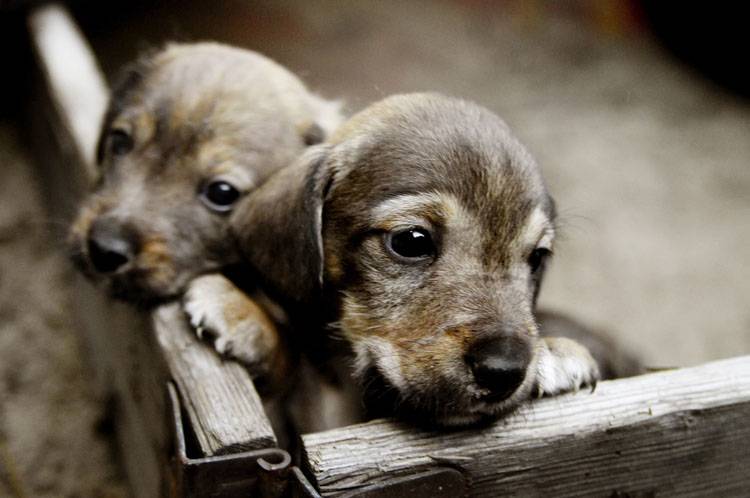Raising Two Puppies at the Same Time
By Beth Harrison, ABCDT
“Should I get a puppy?” “There are only two left in the shelter and I don’t want to split them up.” “Should I get two so they can accompany each other while I’m away during the day?” “If I got two, both my son and daughter could each have one.” “How could two puppies be more trouble to take care of than just one?”
The above frequently asked questions lead to the ultimate question: Are two puppies double the trouble or double the pleasure?
While you may have the best intentions, you’ll soon discover that two puppies actually create about eight times the mess as one. It’s as if they feed off each other’s energy. The problem is not the constant chaos involved with trying to keep up with two pups, but the realization that since the dogs have each other, they really don’t need you. They’re much more interested in roughhousing and running together than the ball games and walks you planned on enjoying with them.
Expert dog breeders are careful about placing two puppies together in one home because they know how much work it is to raise both of them properly. An improperly raised puppy can wind up homeless when the little and cute stage wears off and the defense urge begins to mature. Even dogs who don’t become aggressive can become too rowdy for a family if they weren’t given the right dog training early on.
Bonding with Two Puppies
The underlying problem is bonding. Since the puppies are always together even when you’re not home, their primary bond is with each other—not with you. Puppies are individuals and each one needs a good upbringing.
RELATED: How to Bond With Your Dog
This includes plenty of good experiences with people, places and things. It also includes plenty of training and conditioning to being touched and handled by humans. Much of this work must be done with a puppy one-on-one—away from any other dogs in the household.
Tips for Successfully Raising Two Puppies
Puppies Should Sleep Separately
Within two weeks of coming home, your puppies should be trained to sleep in separate dog crates. However, don’t combine the stress of a new home with that of being separated immediately. Start out by placing the crates side by side. Gradually move the crates apart so that eventually your puppies are comfortable sleeping in different rooms or on either side of the bed. (This also prevents the development of separation anxiety problems should they suddenly have to be apart due to an accident or illness.)
Spend Time With Each Puppy Alone
Each puppy needs plenty of outings with humans and without the other pup around. This is an essential part of a puppy developing an individual identity and the ability to function without the other. It also gives your puppy the desperately needed opportunity to bond with humans.
From the very start, take puppies outside separately as well as together for short excursions around the neighborhood, car rides and socialization visits. This process is best continued at least until a year of age. It can take longer for some dogs.
Attend Puppy Training Class
Your best hope of controlling your dogs when they’re together is to have an excellent dog training foundation for each individually. Each puppy needs to go to dog training class weekly without the other—or at least kept separate within the class. (Note: Some dog trainers will not let family members train two dogs from the same family in the same class.) Make sure to practice the class homework daily away from the other dog. As they become well-trained, you’ll also want to practice working them together so they learn to obey with the pack.
Use Their Names
Your puppies will learn their names faster if you use their names each time you interact with them. In the beginning, names should always be said in a happy tone of voice in a rewarding context, such as when praising, giving meals or teaching commands that are rewarded with praise, petting or treats.
RELATED: 5 Tips for Naming Your Dog
Be a Good Leader
Make sure to be a good leader to your puppies. Don’t let one become excessively dominant over the other. Allow your puppies to establish their relationship, but intervene if one puppy becomes overly domineering. Give each puppy equal time and attention, and don’t favor one over the other. Also, include all of the family members in dog training and caring for the pups so they respond equally to all.
Raising two puppies at the same time is considerably more work than just one. However, if done correctly, you can certainly double your puppy pleasure.
READ MORE: 4 Tips for Bringing a New Pet Home





